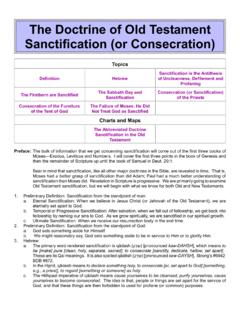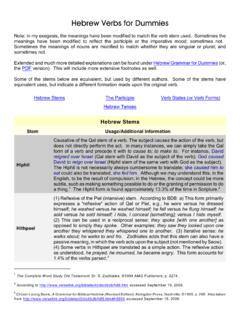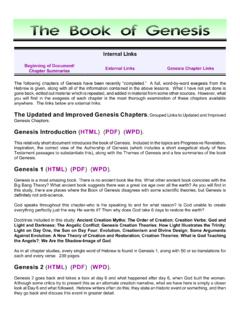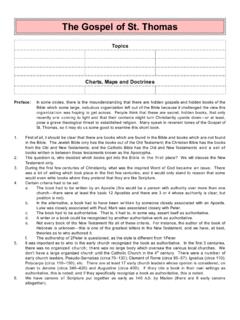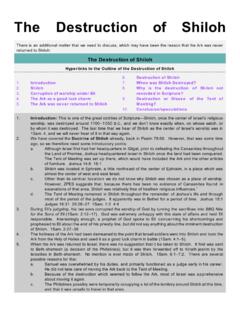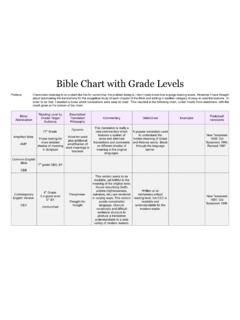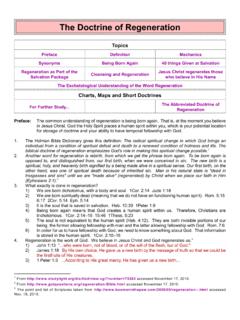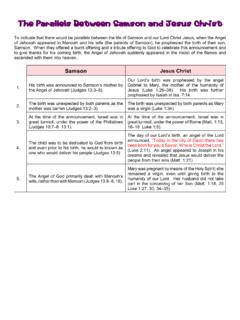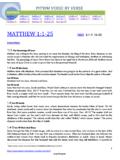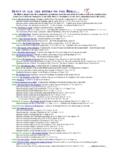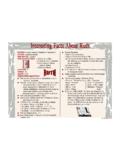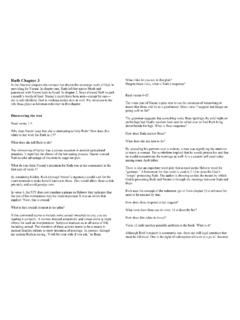Transcription of Boaz as the Kinsman-Redeemer - Kukis
1 boaz as the Kinsman-Redeemer Pre face : In Job 19:25, we briefly covered the Doctrine of Kinsman-Redeemer ; howe v e r, we did not draw careful parallels between the Kinsman-Redeemer and boaz of the Book of Ruth. Few people ever fully appreciate exactly what boaz does and what boaz accomplishes in the Book of Ruth because they lack the background understanding of the Law. In this doctrine, we will examine both functions of boaz in the light of the requirements of the Law. Topics: The He bre w Words De scribing boaz Old Te stame nt Re de mption Re de mption v e rsus Atone me nt M cGe e 's Doctrine of the kinsman -Re de e me r boaz and Ruth Fore shadow Christ and the Church Charts: The Paralle ls Be twe e n boaz and Je sus Christ 1. In the Bible, we have many men and man y s ets of circumstances which foreshadow the coming of our Lord and His work on the cross. There was Abraham offering as a sacrifice his own s o n ; th e re was Moses, the great deliverer; there was David, a man after God's own heart.
2 However, no incident and n o man has ever portrayed our Lord as the Kinsman-Redeemer except for boaz . The person who reads through their Bible once a year might skim through this Book of Ruth and think that it is such a nice and romantic book, but never have a real clue as to why this book found its way into the canon of Scripture, inspired by the Holy Spirit. However, the key is boaz when you fully understand who boaz is, the Kinsman-Redeemer of Ruth, then you realize how absolutely essential this book is to the Old Testament canon. 2. It is actually amazing as to how many theologians who have ta u g h t the Doctrine of Redemption actually by pass the Book of Ruth, as though it has nothing to offer by way of illustration. Jonathan Edwards traced the history of redemption from Moses to David, yet, although he mentions Jephthah, Gideon and Samson, left out boaz altogether. Dr. James Strong, of Strong's Concordance, also wrote Systematic Theology, and, although he covers the redemption of Christ under the chapter heading Christology, he does not give mention to boaz .
3 John Calvin, in Institutes, covers redemption, but leaves out It is sad an unfortunate, as boaz , as the kinsman redeemer of Ruth, brings love to the forefront of this doctrine. 3. boaz is the example of the k insman- redeemer from Scripture, a picture of our Lord Jesus. Initially, we should look at some of the vocabulary which is applied to him. Re turn to Topics a. boaz , in Ruth 2:1, is first called m wda j ( | ) [pronounced moh-DAH or moh-DAHG], which is - generally translated k ins ma n or relative; however, it means a near acquaintance or a close friend. Strong's #4129 BD B # 396. A very similar word is used of boaz in Ruth 3:2. Christ Jesus acts as our close friend. Furthermore, Jesus is fully man. In this respect, He is our kinsman . Had somehow Jesus been not fully human, but even a mixture of, say, divine and angelic natures, we would not believe that He has endured what we have endured on this earth.
4 Even more importantly, His death for our sins would hold less meaning for us, as we would expect Him to be able to endure great pain and suffering, as an Angel-God. However, Jesus took upon Himself our sins and the punishment for our sins in His body on th e c r o ss. He received, while on the cross, the equivalent of our deserved cumulative suffering in His human body. Understand that for those few hours on the cross, what Jesus endured was an eternity of hell for every man, woman and child who has ever lived and will ever liv e . 2 He e ndured this in His humanity. It was because He lived on this earth in His humanity and endured the punishment for our sins in His humanity, that we have been redeemed. b. boaz is then called a man of, gibb wr ( | v x) [pronounced gib-BOAR], which means strong, mighty, valiant. Str o ng's #1368 BDB #150. This is followed by the chayil ( ) [pronounced CHAH-yil ] and it means efficiency, army, strength, valour, power, might; as well as that which is gotten through military 1.
5 This is from J. Vernon McGee, Ruth, the Romance of Redemption; Thru the Bible Books, hPasadena, California, p. 106. 2. Some of you may not grasp how you can take an infinite sum a n d p ro d u ce a finite number; however, this is something which is done in mathematics all of the time. The Doctrine of the Kinsman-Redeemer 2. stren gth wealth, substance. Strong's #2428 BDB #298. This word is used of boaz in Ruth 2:1 4:11. and of Ruth in Ruth 3:11. As the Son of God, Jesus is a Man of strength and a Man of great wealth. By association, we also share His wealth and His strength. c. One of the most important nouns applied to boaz is mishp ch h ( ) [p ronounced mish-paw- KHAW H], which means family, clan, sub-tribe. Strong's #4940 BDB #1046. boaz was both a friend and a relative to Elimelech (Ruth 2:1, 3). Our Lord is related to us by blood. He is a man as well as God, as He is born of Mary. Just as Naomi was not close enough to boaz to plop herself on his front steps when she returned from Moab, we are not close enough to Christ Jesus to have an immediate relationship with Him.
6 At birth, we have Adam's imputed sin and we are born with a functioning old sin nature. At our first opportunity, we sin against God. So, from birth on, we are separate from God, and therefore, separate from Christ Jesus. d. Finally, boaz is called the Qal participle of g gal ( x) [pronounced gaw-AHL], which means redeem, p u r c h a s e . Ev en though it is variously translated in the Qal participle as avenger, revenger, k insman , k insman- redeemer ; it should properly be rendered redeeme r, purchaser, redeeming, purchasing. Because the nearest relative has the right of redemption, this wo r d is a lso translated k insman. Strong's #1350 BDB #145. We find the verb used in Ru th 3:13 4:4, 6 (actually several times in each verse) and the participle used in Ruth 2:20 3:9, 12 4:1, 3, 6, 8, 14 (yes, I realize that the participle is a form of the verb; however, the participle is primarily used as a noun).
7 boaz , through his purchase of the property, revived the name of the dead; so Christ, with the purchase of His blood, caused us, as those who deserve death, to live. 4. There are two Old Testament laws which need to be examined here: Re turn to Topics a. The Law of the Right of Redemption: Every 50 years, Israel was to celebrate the Year of Jubilee. This might be looked upon as a super-Sabbath year. On this Year of Jubilee, each of you will return to his own property. If, furthermore, you have sold your land to your friend, or you have purchased land from your friend's hand, you will not do wrong to one another. Corresponding to the number of years after the Jubilee, you will buy from your friend; he is to sell to you according to the number of years of crops. In proportion to the number of y e a r s , y o u will increase its price, and in proportion to the fewness of the years, you will diminish its price; for it is actually the number of crops that he is selling to you.
8 So you will not wrong one another, but you will fear your God, for I am Jehovah your , the land will not be sold permanently, for the land is Mine; you are aliens and temporary residents with Me. Thus, for every portion of land, you are to provide for the redemption of the land. If a brother of yours becomes so poor he has to sell part of his property, then his nearest kinsman is to come and buy back what his relative has sold. Or, in case a ma n h a s no redeemer , but so recovers his means as to find sufficient for its redemption, then he will calculate th e y e a r s s in c e it sale and refund the balance to the man to whom he sold it, and so return to his property. But if he has not found sufficient means to get it back for himself, then what he has sold will remain in the hands of its purchaser until the Year of Jubilee; and at the Year of Jubilee, it will go back, that he may return to his property.
9 (Lev. 25:15 17, 23 28). What this recognizes is the people will buy and sell the inheritance which God has given them. God had given the la nd as a permanent inheritance, but, people being what they are and life being wha t it is , th e y occasionally are forced to sell what God has given them. No matter what you have to sell, for some price, there is a buyer. However, God makes is clear in this passage that the purchase of a piece of land that is not your original inheritance is temporary. The price for the land is in part determined by the number of years s in c e th e p r e v io u s Year of Jubilee. A person who sells his inheritance soon after a Year of Jubilee was to get the most for it and the person who sold it long after a Year of Jubilee would get the least for it. At any time, a relative or that person could come back and buy back his land. What he would pay would be proportional to the number of years that the land had been owned by another.
10 To d a y, if I. became poor and sold a house, and then, if I became successful and was able to buy the house back, then I would generally end up paying much more for the house than I sold it for, due to inflation and the rising value of the property. Not so under the Mosaic Law. Let's say there were 20 years remaining until the next Year of Jubilee and I have a piece of property that, the day after the Year of Jubilee, was worth $100,000. I could sell that property for $40,000. Now, obviously I would end up selling the property, under the dispensation of Israel, because I had become poor and could not afford to live and could not afford to cultivate the property. Now, let's say, 10 years go by and either I, or a close relative of mine, can afford to purchase the property back. I am allowed to purchase the property back, under the Mosaic Law, at any Ruth 4:10 3. time, with financial recognition given to the number of years which have gone by.
